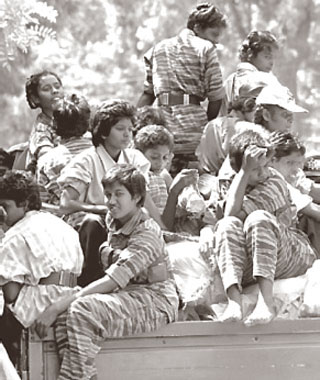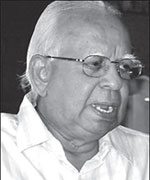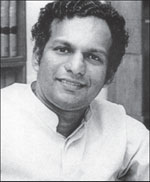Disingenuous, selective and championing of polarization
Response to TNA statement (March 14, 2012) :
Arun TAMBIMUTTU- SLFP organizer for Batticaloa
This refers to and is a response to a statement released by the Tamil
National Alliance on March 14, 2012, which refers to Sri Lanka, makes a
critique of her history, the conflict, processes of reconciliation and
ends with a call for action by the United Nations Human Rights Council.
The document alleges that the government of Sri Lanka has serious
issues with regard to telling the truth and keeping its promises,
outlines what the TNA believes are broken promises on political
settlement, discusses the conduct of the war and allegations of human
rights violations and calls for UNHRC action.
The document raises some important issues that are of concern to all
Sri Lankans, but is found lacking in moral weight, and is suffused with
inaccuracies and part-truths, and is conspicuously silent on the
considerable progress made on all these issues.
|

Former LTTE child soldiers. File photo |
I write as a Sri Lankan Tamil and as someone who has suffered on
account of the conflict. I was a victim of physical torture by the LTTE
when I was only 13-years-old. I was shot through my ankle, kidnapped and
imprisoned. My supposed crime was being the only child of a
democratically elected representative of the Tamil people! A few months
later they killed both my parents (Sam Tambimuttu, MP for Batticaloa and
Kala Tambimuttu) in front of Canadian High Commission in Colombo.
I write also as someone concerned about all citizens of Sri Lanka and
because I consider the TNA statement too important to reject without
comment, particularly since distortion of reality impedes and not
fosters reconciliation and national integrity in the aftermath of a
brutal and bloody conflict that held the entire country to ransom for 30
long years. This statement addresses the core issues articulated by the
TNA in order to set the record straight and advance the interest of
reason over rhetoric and provides a necessary preamble that places the
TNA in its historical context. I sincerely believe that this will
provide the logical platform for a) assessing the true weight of the TNA
statement, and b) restore sanity to the debate on Sri Lanka’s post-war
efforts at reconciliation.
Preamble
The TNA came into being as a political formulation consisting of
parties and groups that had resolved to act as the LTTE’s proxy in
Parliament and other forums, a fact reflected in its first election
manifesto in 2004. The TNA not only recognized the LTTE as ‘The
sole-representatives of the Tamil people’, but kept a conspicuous
silence on all crimes against humanity and all acts of terrorism
perpetrated by the LTTE from the time it came into being until the LTTE
was militarily defeated. Even today, when referring to the past, the TNA
refrains from condemning the LTTE apart from cursory and tokenistic
references.
The TNA leadership has never condemned the numerous atrocities
committed by the LTTE including but not limited to the following:
The brutal suppression of Tamil voices opposing the LTTE, through
intimidation, assassination of leaders, parliamentarians and political
activists such as Raviraj and Ketheeh Loganathan among many others, and
massacring of cadres (in the case of other militant groups) and party
activists (of parties in the democratic mainstream).
The assassination of Tamils elected to office even before the TNA
formally came into existence - those in local government bodies,
provincial councils and Parliament. (This includes the leader of the
TULF, Appapillai Amirthalingam and other noteworthy parliamentarians and
human rights advocates such as Neelan Thiruchelvam. The TNA leader R
Sampanthan, it must be noted, although a Member of Parliament (1977-1983
and 2003 to date) and a Politburo member of the Federal Party and the
Tamil United Liberation Front, never once condemned any of these
assassinations of fellow party members).
The ethnic cleansing of Muslims from the Jaffna Peninsula and the
innumerable attacks on Muslims and Sinhalese villages in the Eastern
Province, effecting rendering 1 in every 10 Muslim in the island an IDP.
*The attacks on places of religious significance such as the Sacred
Bo Tree in Anuradhapura and the Sacred Temple of the Tooth in Kandy.
*The summary execution of over 600 unarmed policemen who had
surrendered to the LTTE.
*The brutal killing of over 147 Muslims in the precincts of 4 mosques
in Kattankudy.
*The butchery of over 100 Sinhalese civilians including infants and
toddlers in Batticaloa town
*The abduction and forced recruitment children for combat purposes by
the LTTE.
Apart from the above glaring omissions which seriously compromise the
moral right to point fingers, it cannot be stressed enough that the TNA
is not the only Tamil political formation in the island and does not
represent the entirety of Tamils, either in the North and East or the
rest of the island. Moreover, on the issue of accountability the TNA
has, by omission and commission, been complicit and an accessory after
the fact of every single transgression by the LTTE including child
conscription, political assassination, suicide bombing and other attacks
on civilian targets, as well as other acts of terrorism.
The TNA, even while pledging allegiance to sovereignty, has always
advocated separatism. Its commitment to reconciliation and peace are
highly questionable in light of political statements by key leaders
contending that it has chosen a strategy of creating the conditions that
could facilitate the division of the country.

R. Sampanthan |

Neelan Thiruchelvam |
Notwithstanding the above, I continue to acknowledge the TNA as a
legitimate political entity entitled to preferences and opinions, and
therefore worthy of engagement in the spirit of democracy and decency
and hence make the following observations on its lengthy though
repetitive and slanted statement that is replete also with factual
inaccuracies and misleading representations.
Telling the truth and keeping promises
The TNA’s complaints regarding discriminatory legislation largely
refer to matters that have long since been corrected. In particular the
reference to the Soulbury Constitution and Section 29(2)(b) and (c) are
no longer relevant with the issue of equality of citizenship being
effectively resolved in the 1978 Constitution in the Chapter on
Fundamental Rights, a correction that the TNA (as a party and as
individuals) has consistently and numerously invoked in order to obtain
redress from the justice system. This includes, interestingly, numerous
occasions where TNA lawyers have sought and obtained release of
suspected LTTE members. The TNA and its lawyerly leaders seem to have
conveniently forgotten the fact that fundamental rights legislation
essentially makes for class action suits, which effectively means that
the kind of affirmative action envisaged in the Soulbury constitution
can in fact be realized through judicial intervention.
Similarly, the anomalies pertaining to language have long since been
corrected and corrections enshrined in the constitution.
I note that while implementation of the same in administrative
matters has lagged in certain instances, the situation has improved over
the years and has gathered momentum subsequent to the end of the war.
It is unfortunate that the TNA has chosen to leave out these
developments in its statement, but more seriously, this omission is
reflective of a deliberate objective to deceive and mislead. It is,
ironically, deceitful and untrue, and therefore mischievous and
irresponsible.
The issue of political settlement
The TNA has commented at length on ‘the non-implementation of the
13th Amendment’. In this regard, I make the following observations;
Almost immediately after the 13th Amendment was passed, the LTTE (of
which the TNA became a proxy with its key leaders having largely toed
the LTTE-line from the late 1980s) rejected it complaining that it fell
short of aspirations of Tamil people and launched a brutal campaign to
assassinate members elected to the North-Eastern Provincial Council.
Full enactment of the 13th Amendment was rendered impossible
thereafter due to a) LTTE choosing the military option, b) the LTTE
reneging on several rounds of talks to negotiate a settlement.
The principal obstacle to the implementation of the 13th Amendment
was the LTTE and by extension and proxy, the TNA.
It was with the end of the war that a semblance of normalcy returned
to these areas.
Significant improvements in resettlement, rehabilitation and
reconstruction needed to take place before conditions conducive to the
holding of elections could take place.
With necessarily gradual demilitarization, resettlement of displaced
persons, minimum degrees of reconstruction including infrastructure
development (necessitated by the considerable destruction wrought, in
particular, by the LTTE), elections have been held for local government
bodies in the North and East and for the Eastern Provincial Council.
Elections for the Northern Province are to be conducted shortly.
The TNA, while failing to acknowledge the LTTE’s role in hampering
these processes and developments, refuses also to acknowledge the new
ground realities, including vast changes in demography as well as the
new political aspirations of all communities. In fact, meaningful
devolution in a manner that is acceptable to all communities (as
recommended by the LLRC) has a better chance of succeeding now, simply
because its main objector, the military wing of the LTTE, is no longer
part of the political equation.
The TNA does not mention the important statistical fact that 54
percent of Tamils of Sri Lanka live outside the Northern and Eastern
Provinces. TNA’s tendency to harp on ‘homelands’ is therefore not only
erroneous and misleading but shows scant regard for Tamils living in
other parts of the country.
It must be noted Sinhalese, for example have become a minority in the
City of Colombo, whilst the population make up of many areas in Colombo
District has become overwhelmingly Tamil. These changes and realities
have not caused social disharmony, but are accepted, acknowledged and
largely celebrated by all communities. We have progressed from ‘the bad
old days of 1983’, a fact that well known to TNA and its Colombo
resident Leadership, who refused to acknowledge for narrow political
purposes.
The TNA faults the government for withdrawing from discussions (with
the TNA), but fails to mention the fundamental political truth that Sri
Lanka is not made of the government and the TNA and that only an
inclusive process of debate and negotiation can generate resolutions on
all outstanding issues of citizenship anomalies, meaningful
representation, and ownership in decision-making processes.
Moreover, the TNA, during the entire process remained intransigent
and insisted on a ‘final outcome’ being agreed upon prior to submitting
names to the Parliamentary Select Committee that is mandated to arrive
at a comprehensive mechanism to address these issues.
The TNA fails to understand that sovereignty is exercised through
Parliament and that only an inclusive process has the chance of winning
necessary support and being enacted into law. The government is not in a
position to be presumptuous about parliamentary ‘guarantees’ as sought
by the TNA and demanding the same amounts to spoiler tactics.
Most importantly, the TNA’s intransigence included putting forward
non-negotiable demands which is reminiscent of the LTTE’s modus operandi
when it comes to ‘negotiations’. The quisling does seem to follow the
only too well known policy of the terrorist LTTE in this regard.
This not only compromises the TNA’s bona fides in terms of wanting
settlement but more seriously indicates a malicious desire for continued
polarization of the polity, which I suspect is born out of the
imperatives of political survival and relevancy; i.e.: solving the
problem through political means could effectively stop the TNA from
exploiting alleged ‘grievances’, and in effect making a beggars wound
out of allegedly outstanding issues, with the cynical goal of achieving
its objectives such as that for separatism for instance which most right
thinking persons know, the LTTE’s quisling party has not abandoned.
Human rights
The TNA contends that various commissions appointed to inquire into
human rights violations were ‘designed to fail’, citing in particular
the Commission of Inquiry (COI) mandated to look into 12 incidents, some
by the Security Forces and Police and others by the LTTE, such as the
murder of Lakshman Kadirgamar, the Digampathana massacre etc.
By the time the government decided to discontinue the Extended
Mandate of the COI, all investigations related to alleged excesses by
the Police and Security Forces were completed. Even during the sittings,
several indictments were issued by the AG’s Dept pertaining to some
cases. Two inquiries (17 aid workers, and five youths in Trincomalee in
2006) are what the TNA focuses on.
With respect to the second, the TNA quotes a statement released by an
International Independent Group of Eminent Persons (IIGEP) headed by
former Chief Justice of India, J. N. Bhagwati, charged with observing
proceedings, where reasons are given for ‘terminating involvement’. The
TNA fails to mention that Justice Bhagwati disassociated himself from
this statement.
To be continued |



